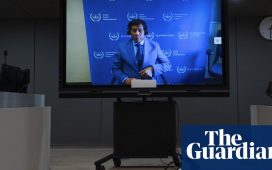4.30pm: And that is that. Sir Wyn wraps up proceedings by thanking Rodric Williams for his detailed witness statement and thanks counsel for sticking to time. Next week is a key one, when we will hear from former Post Office general counsel Susan Crichton (Tuesday) and Chris Aujard (Wednesday). We’ll be back then with live updates. Have a nice weekend everyone.
4.10pm: A late twist as the inquiry is shown an email from Post Office lawyer Emily Springford from 2011 in which she states that four sub-postmasters are considering legal action over Horizon and are asking questions.
The advice from Springford, who left the organisation in 2012, is for staff to think ‘very carefully before committing to writing anything relating to [these] issues which is critical of our own processes, including emails, reports or briefing notes’.
Tim Moloney KC, representing sub-postmasters, says the effect of this was essentially that if anyone wants to be critical of Horizon then they should be careful before putting it in writing, adding: ‘Ironically, this is in writing, in black and white.’ He says the instruction was ‘far from lawful, open and transparent.’ Going back to this morning, Moloney points out the similarities between this and the Clarke Advice on being careful about what documents are disclosable and what should not be put in writing.
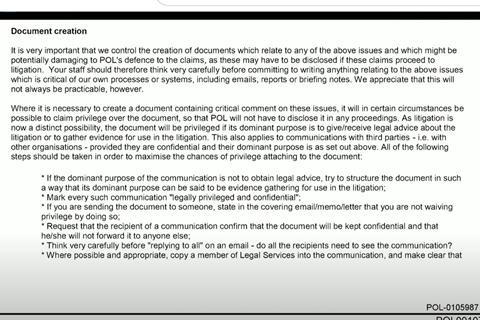
3.40pm: Jacobs’ final point is around documents showing the Post Office opted not to call Gareth Jenkins as a witness in the Bates litigation because of his previous involvement with criminal trials.
Williams appears to struggle over some of the questions before chair Sir Wyn Williams (no relation) makes a rare intervention.
‘Hang on, Mr Williams, we know why you didn’t call Mr Jenkins – or at least there is a document which explains that – before the litigation which was that you thought his credibility was shot. That is why you didn’t call him isn’t it?’
The solicitor concedes that this is correct.
3.30pm: Jacobs brings up the issue of Williams having been on the steering committee for the Bates litigation and now being involved with decisions over redress and compensation.
‘My clients say you are one of the historical matters. You should not be remediating against your own actions.’
3.15pm: Williams repeatedly denies the Post Office had a deliberate strategy to drag out the Bates litigation until the claimants ran out of money.
The inquiry then sees an email from Parsons to Williams in 2017 from claimant firm Freeths, which says: ‘My witness statement has really annoyed them. This is good – the more time they waste on side correspondence the less time they are spending on important matters!’
Williams is asked again if it was part of the strategy to wait until claimants ran out of money, but he says this was not right as there was cost budgeting already in place and the Post Office didn’t know what finances were available to claimants.
2.50pm: Back to the Post Office strategy in the Bates litigation. The inquiry is shown the recommended strategy of the Post Office steering group, of which Williams was a member. It states that the preferred solution is to ‘try to force the claimants into a collective position where they will either abandon the claims or seek a reasonable settlement… our target audience is [claimant firm] Freeths, the funder, and the insurers who will adopt a cold, logical assessment of whether they will get a pay-out, rather than the claimants who may wish to fight on principle regardless of merit’.
Williams denies that Post Office was ‘targeting the pockets’ of insurers, funders and lawyers.
2.40pm: Discussing the Post Office’s potential response to Second Sight, Williams emailed colleagues: ‘I’d like to avoid giving anything if at all possible (less is more).’
Jacobs says his clients all say the Post Office did not want this information getting out and did not want people knowing where monies had gone. The inquiry hears that Second Sight was never given an answer to its questions about the suspense accounts.
2.30pm: Next to question Williams is counsel Christopher Jacobs, who represents more than 150 sub-postmasters. The inquiry is taken to a request from 2014 from Second Sight, which is looking into Horizon issues, for information on whether monies from suspense accounts paid into by SPMs are then fed into the Post Office profit and loss figures. Essentially: when sub-postmasters are told to pay for shortfalls, where did the money go?
Second Sight is told by Post Office that the information requested is ‘highly sensitive and would only be made available in exceptional circumstances’. A draft internal email says the figures in the suspense accounts are ‘quite high’ and this may be portrayed as if there are significant sums that cannot be reconciled each month.
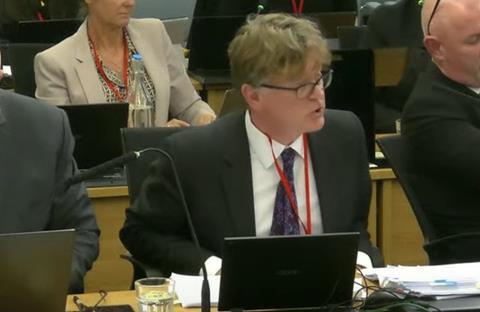
1.15pm: Before the inquiry broke for lunch there were questions to Williams about why he appeared to do nothing to address the flawed conviction of Seema Misra from 2010, despite having evidence through the Second Sight report and other evidence that the evidence used to convict her was unreliable. Henry says at the very least Williams knew there had been a miscarriage of justice from 2016 onwards.
Misra, who was pregnant at the time she was jailed and gave birth wearing an electronic tag, did not have her conviction overturned until 2021.
Williams says: ‘I take no pride, comfort or confidence in having worked for an employer that engaged and conducted the greatest miscarriage of justice that we have seen. It is awful that people with convictions had them and had them for the length of time they did. And for my part in that I am truly sorry.’
Henry replies: ‘You were not just associated with it, you were in the middle of the web.’
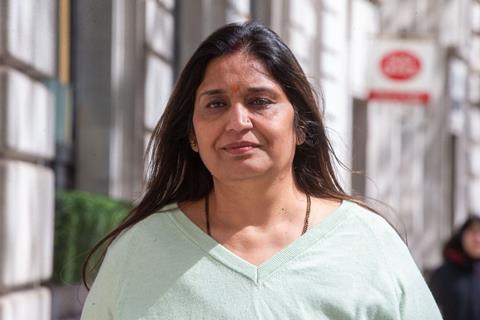
12.55pm: Getting very spicey in these exchanges. Henry says the Post Office fought the Bates litigation ‘tooth and claw because you all knew that if you lost the civil litigation a cascade of criminal appeals would follow’.
Williams says he was not thinking of this at the time.
Henry replies: ‘I suggest you are lying.’
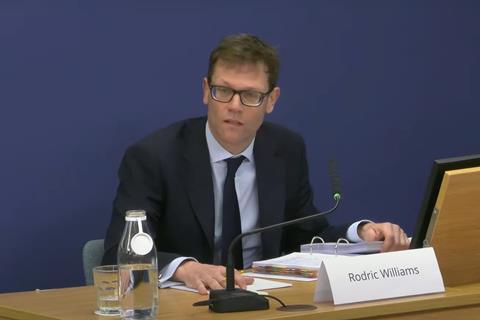
12.35pm: The inquiry sees an internal email from Williams discussing the Post Office response to a BBC enquiry about Horizon prosecutions, suggesting the organisation should be ‘Post Office is acutely aware of the duties imposed on it when it brings a prosecution, and is confident that it has acted in accordance with those duties at all times.’
Henry points out that at this stage Williams knew about defects in the system, knew that Jenkins’ evidence in trials was compromised and knew that remote access was possible.
12.30pm: The first representative of victims, Ed Henry KC, is now called to ask questions. He immediately centres on Williams’ conduct, asking whether he discharged his duties as a solicitor at all times. Williams says he ‘certainly sought to’.
Henry replies: ‘I strongly suggest you did not and that you knew you did not.’
Williams says: ‘I would like to know why you think that.’
Henry says: ‘You were part of the suppression, obstruction and cover-up of people’s article six appellate rights.’
Williams responds: ‘I’m sorry, I don’t have the article in front of me.’
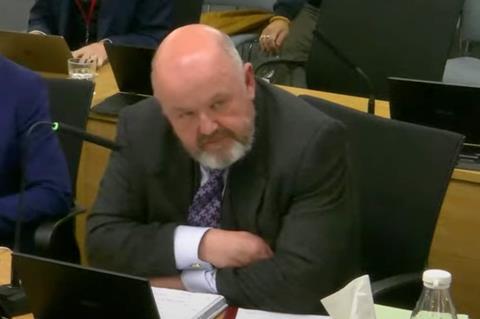
12.05pm: Beer continues pressing on the issue of remote access and the Post Office’s response as it emerged that branch accounts could be changed.
The key element appears to be the Deloitte report in 2014 for Post Office that this was possible, which appears to contradict the line being taken by Post Office. The inquiry also sees an email exchange from the time – between Rodric Williams and Andrew Parsons – where they discuss a witness statement from Fujitsu expert witness Gareth Jenkins, where he said that ‘it is true that [remote] access is possible’. Parsons says it only refers to balancing transactions in branches but that this revelation would be a ‘red rag’ to the accountants Second Sight, who are assessing the robustness of Horizon. He later says this information would be ‘entirely new’ to Second Sight.
Williams says he does not know whether this should have been disclosed, saying he had ‘not contextualised’ the email exchange since receiving it. When asked why he did not raise these issues sooner, he says: ‘I regret it, I promise.’ For the first time he looks close to tears.
11.25am: Beer moves on to the crucial issue of remote access to branch accounts. Accountants Second Sight had raised issues about this and Fujitsu’s James Davidson had written to Williams assuring him there was no ability to remotely alter accounts, although they could be ‘injected’ with new data if this was approved in branches.
Deloitte then reported internally to the Post Office that there was the possibility of changing data remotely. Williams thought this ‘inherently unlikely’ as it would involve a deliberate and fraudulent act. Both Second Sight and the BBC were assured by Post Office that remote access was not possible – contradicting the Deloitte report – and Williams admits: ‘I missed this.’
The inquiry sees an email to Williams and others later that year from Post Office communications manager Melanie Corfield where she states: ‘Our current line if we are asked about remote access potentially being used to change branch data/transactions is simply: “This is not and never has been possible”. This line holds but if we are presented regarding SS’s points about “admitting” there is remote access, etc, we can say: “There is no remote access for individual branch transactions”.’
Williams admits these lines were ‘not accurate’. The inquiry heads for a break.
11.10am: Discussion then moves to the instruction of accountants Deloitte to produce a purportedly independent report on Horizon in 2014. Williams’ email instructions were that the Post Office ‘wants to demonstrate’ that the Horizon system is robust, fit for purpose and/or operates within an appropriate control framework’.
Beer says this note ‘doesn’t particularly suggest the Post Office was looking for objective findings’ and that the organisation appeared to be framing the review in the outcome that it wanted.
Williams firstly says he doesn’t want to be flippant before pausing and saying ‘so I won’t be’.
He answers: ‘There are many things people want but they don’t get them.’
Beers says: ‘Is that your best answer?’ Williams replies that it is.
11am: The inquiry sees the notes of a meeting from 2013 attended by Post Office lawyers including Williams and external lawyers from Cartwright King and Bond Dickinson. The idea of preventing the ‘bandwagon effect’ was openly discussed as lawyers warned about the risk that negative feedback on Horizon would encourage sub-postmasters to challege their previous convictions.
Williams is asked why he agreed with this sentiment and responds: ‘Sitting here today and quite possibly at the time, if someone gains currency people will gather around behind it. That seemed logical to me.’
10.15am: The inquiry is pressing Williams on his response to the notorious Clarke Advice, relating to instructions given to external barrister Simon Clarke on the Post Office approach. A document written in 2013 says that Clarke was advised that minutes and emails relating to discussions about Horizon ‘should be and have been destroyed’ and ‘shredded’. This was following a recommendation by Post Office head of security John Scott.
Williams says this is an ‘extremely serious allegation’ and the inquiry sees a letter he drafted for general counsel Susan Crichton in which she states the Post Office is ‘deeply concerned’ at the suggestion that documents should be destroyed. But there appears to have been no investigation by the Post Office about whether the advice was carried out.
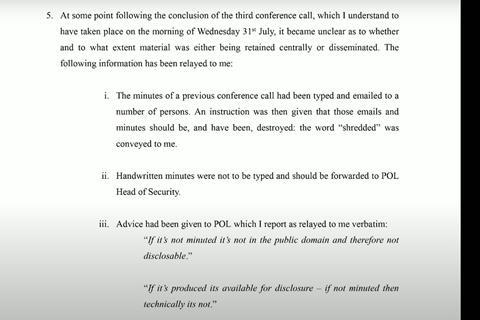
10.10am: A quick recap on what came up yesterday. The inquiry heard that Williams was derogatory about sub-postmasters in internal emails, derided journalists who enquired about the Horizon system and did nothing in response to a suggestion from an external lawyer that the Post Office suppress important documents.
You can read details here.
9.55am: Day two of Rodric Williams’ evidence is now underway, with inquiry counsel Jason Beer KC once again asking questions to the Post Office’s head of legal.
Once Beer is finished, inquiry chair Sir Wyn Williams had allowed three groups of core participants – representing victims of the scandal – 45 minutes each to put their questions to Williams.
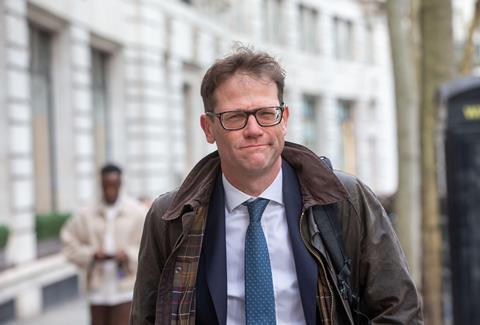
Welcome back to our live coverage of the Post Office Inquiry, and the first time in Phase Five that we have heard from a lawyer witness. New Zealander Rodric Williams, who was admitted as a solicitor in England and Wales in 2002, joined the organisation in 2012. He started giving evidence on Thursday and concludes today.






